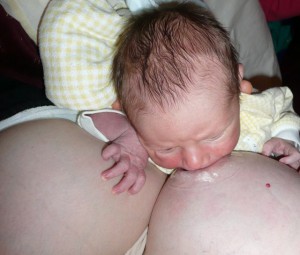
What now?
So you are pregnant. You are planning to breastfeed. You know that it’s normal, natural and that all other mammals breastfeed. You’ve heard about breastfeeding classes, but why should you take one? Isn’t this something that mothers and babies just do?
Breastfeeding parents and babies are equipped with very helpful instincts* and, in the case of babies, strong reflexes to ensure successful feedings. A baby’s survival depends on their ability to find the breast, latch on* and suckle with just a little help from their parent. But here in the United States, and many other industrialized societies, birth practices and our very culture can mask and even undermine what comes naturally.
New parents often assume that they will get breastfeeding help in the hospital. There may be excellent lactation consultants on staff, but many are only available during the week day—not at night or weekends. Even if you are one of the people who will see a lactation consultant, it is likely your “visit” will be 15 minutes or less. In addition, it is highly unlikely that the consultant will be able to time their visit for the moment you are actually attempting to feed your baby.
Families usually leave the hospital less than 2 days after giving birth. Will a lactation consultant be visiting you on day 3 or 4 when your breasts are swollen*? Will anyone be automatically checking on you and the baby to make sure that baby is hydrated*, gaining weight* and your nipples are healthy*?
“I always tell people that taking a class before the baby came was the best thing I did. I’m so glad that my husband was there, too! He remembered tips and tricks we learned and was also super supportive after learning how beneficial it is!” Cathy Y.
If you are lucky enough to be surrounded by family and friends who have nursed multiple babies, it probably doesn’t matter that you are not provided with a lactation consultant to ensure all is well. You will likely have all the help you need. But, honestly, this is a very rare occurrence in the U.S. and many other parts of the world.
It’s likely that you have never seen a baby breastfeed up close and personal. If you’re like most of my clients, you have seen babies breastfeed from across the room, maybe under some kind of shawl. You probably averted your eyes. That is normal in our culture. We know it’s happening, but it is not ok to look! How can you possibly learn any new skill without seeing it happen and asking questions about it?
A prenatal breastfeeding class will provide you with information, a safe, encouraging place to ask questions and see pictures and videos of babies breastfeeding.
“It’s important to know at least the basics: latch*, hunger signs*, what’s normal in your infant and from our body. All good to know this before you are overwhelmed.” Audrey L.
Here are some topics that are typically covered in a breastfeeding class:
Basic physiology of lactation
Basic information about the content of human milk
What to expect in the first hours and days after birth
How to know if your baby is getting enough milk
Normal newborn behavior and reflexes that assist with feeding
How to help your baby with feeding
Signs that everything is going well
Common challenges and how to avoid them and/or overcome them
How to identify when things are NOT going well
Who to call for help
“What I loved about the class was seeing videos of real babies breastfeeding. They really helped me to understand breastfeeding.”
A breastfeeding class can’t prepare you for every eventuality, but it can give you confidence and information that can make all the difference after your baby is born.
*You will learn about these things and much more in your prenatal breastfeeding class!
For a private, prenatal breastfeeding class in the Seattle area, contact Renee to arrange it! If you’d like to take a class in the comfort of your own home without scheduling an appointment, register for my virtual Breastfeeding 101!




 I just wanted to take a moment to say thank you so much for everything you have helped us accomplish this past year. Today is my son, Robbie’s, first birthday, and I am happy to say we are still pumping, and strongly committed to at least 18 months.
I just wanted to take a moment to say thank you so much for everything you have helped us accomplish this past year. Today is my son, Robbie’s, first birthday, and I am happy to say we are still pumping, and strongly committed to at least 18 months.